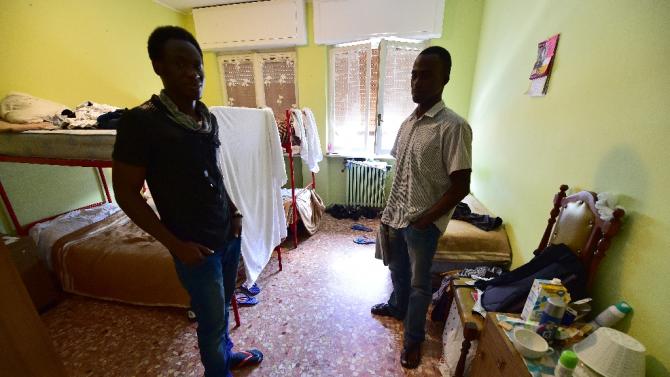Date: Tue, 19 May 2015 11:20:22 +0200
Aosta (Italy) (AFP) - With its refugee reception facilities bursting at the seams, Italy is starting to show the strains created by thousands of people washing up every week on its southern shores.
From a pristine Alpine valley to the country club suburbs of Rome, government efforts to find temporary accommodation for a seemingly endless wave of economic migrants and asylum seekers have run into opposition that far right politicians portray as a backlash against the unprecedented level of new arrivals.
Not true, says Augusto Rollandin, the president of Val d'Aosta, a picturesque region in the foothills of the Alps that is point blank refusing to accept any more than the modest total of 62 asylum seekers it is currently housing.
The region, he says, simply does not have the facilities to put any more people up in decent conditions.
"It is not an ideological position. It is not about being selfish," he insists.
"I think it is a question of what sort of welcome we provide. You can't just put people in any old place," he told AFPTV, stressing that the region of 128,000 people was working to develop new reception facilities.
When will they be ready? How many people will they house? The regional president is not saying.
Officials in Rome meanwhile are pondering their next move in a stand-off that is being watched closely by much bigger regions such as Lombardy and Veneto, where influential figures in the virulently anti-immigrant Northern League are urging their council colleagues to follow Aosta's lead.
- Placards and pickets -
Events in Val d'Aosta have also been much discussed in Casale San Nicola, a leafy neighbourhood 10 miles (16 kilometres) north of Rome. Local authorities there are trying to place a group of around 100 refugees in a disused former school in the teeth of fierce local resistance.
With its country lanes lined with umbrella pine trees and the electronic gates of villas that are popular with expatriate executives and UN staffers, this is not the sort of place you expect to see protest placards, pickets and blazing rows in the street.
All that has changed in the last two weeks as dozens of residents have been spending all day, every day maintaining a protest vigil. They stand under a giant banner voicing their opposition to the imminent arrival of refugees in a neighbourhood currently best known for its tennis club and nearby stables, where some of Rome's rich and powerful arrive by helicopter for weekend rides.
According to their spokesmen, the residents are protesting because they believe the school building has inadequate sanitation and fire-safety to house the proposed number of refugees.
"The school closed because they could not afford to make the health and safety upgrades required for a roll of 25, so how can it be deemed adequate for 100 people to live in? This has got absolutely nothing to do with racism of any sort or being against refugees," said Ilaria Morichelli d'Altemps, one of the organisers of a movement lampooned as "the revolt of the chic" by Italian media.
Other residents talk of security concerns or simply admit they don't want refugees in their back yard, dragging down property values.
- Immigration business -
There is also anger over a lack of consultation by the local authorities and questions about whether the new centre could become the latest of many in the Rome region to serve the interests of shadowy business groups that see the migration crisis as an opportunity to skim off a cut of the millions spent to ensure Italy meets its asylum obligations.
Standing outside the school at the heart of the dispute, the woman in charge of preparing it for its new residents says she knows exactly why the neighbours are protesting.
"And it is nothing to do with the adequacy of the building," says Michela Fagiolari with a wry smirk.
"Everything might not be perfect but it will be legal, it has to be. We are dealing with an emergency. These people have to be found somewhere to stay now, they can't wait forever."
An ongoing police probe last year uncovered evidence of organised crime siphoning off money that was supposed to help ethnic Roma migrants and asylum seekers in the Rome area. One mobster was caught on a wiretap declaring that such scams were far more lucrative than drug dealing.
But anger at the "immigration business" was also the rallying call of residents in another part of Rome, the run down district of Tor Sapienza, when they stoned and fire-bombed a migrant holding centre, eventually forcing the municipal authorities to move the people living there elsewhere.
Such displays of outright hostility to migrants remain extremely rare, however, and some of the lucky few taken in by Aosta say they have encountered little racism from ordinary Italians.
Instead, their main complaint is that their situation means they cannot work and give something back to Italian society.
"Everyone wants to work," said Modibo Traore, a 31-year-old from Mali who is one of 18 asylum seekers currently housed in La Sorgente, a converted hotel in the town of Aosta.
"You've left Africa because there's trouble, you're in hot water. But here it's like you're still there, it's like you were in one hell and you have come to another."

